Problematic Language and Vague Rhetoric in the Tech Industry
A few weeks ago, my friend invited me to join him at a Barcelona job fair. Procrastination got the better of me and I tagged along on a morning jaunt. The majority of the exhibitors were tech companies, which comes at no surprise considering Barcelona has become an important hub in the tech industry.
While I didn’t leave with a job offer, I did spot some copy that could do with a bit of refinement.
Table of Contents
Barcelona Expat Life
This is the name of the company who organised the job fair.
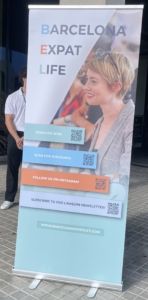 As a Brit living in Europe, some may label me as an expat. However, when I looked up the difference between “expat” and “immigrant” on Google, the consensus is that an expat intends to return to their home country after a period abroad. Whereas an immigrant plans to stay in their new country indefinitely. Given that I have no intention of returning to the UK, I should be considered an immigrant.
As a Brit living in Europe, some may label me as an expat. However, when I looked up the difference between “expat” and “immigrant” on Google, the consensus is that an expat intends to return to their home country after a period abroad. Whereas an immigrant plans to stay in their new country indefinitely. Given that I have no intention of returning to the UK, I should be considered an immigrant.
If they are using the term correctly, their clientele would be expected to return to their respective countries after a period of time. However, based on their website and the services they offer, I get the impression that this isn’t their intent. After all, how can they be certain that their audience plans to return to their homeland?
The issue, however, is that the term “expat” has undergone semantic drift, and its use has become problematic. It carries outdated connotations of colonialism and socio-economic privilege, often referring to Western nationals living abroad. While those from non-Western countries are labelled “immigrants.” This distinction perpetuates an us-vs-them mentality, commonly found in Murdoch media outlets like The Daily Mail. This in turn fosters bigotry and racism in our society.
In today’s globalised tech industry, where diversity and interconnections are paramount, we should have moved away from antiquated distinctions a long time ago. Anyone who has moved across borders to contribute to a global economy are immigrants
Misleading Words
Taking a look at the slogans used on the exhibitors’ trade show banners, we can see how the language can be somewhat misleading. Opting for overly polished language that sounds impressive at first but lacks substance upon closer inspection.
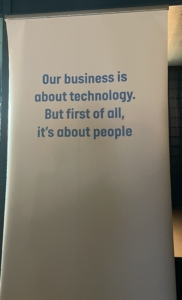 (…)But First of All, It’s About People – ComputaCenter
(…)But First of All, It’s About People – ComputaCenter
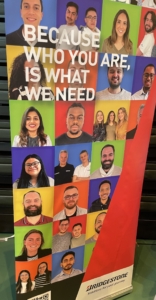 Because Who You Are, Is What We Need – Bridgestone
Because Who You Are, Is What We Need – Bridgestone
We know this rhetoric to be untrue. Why? Because corporations and tech companies prioritise shareholders and the bottom line. Profits take precedence over employee well-being, diversity, or long-term sustainability.
In a recent article from Forbes titled “The Great Tech Reset: Unpacking the Layoff Surge of 2024”, we learn about a 15% reduction in global workforce, with the tech industry laying off over 124,000 workers in 2024 alone (the article was published in August, 2024)
Of course, external factors influence these decisions to lay off employees: industries are still rebounding from the global pandemic, facing an economic downturn, and dealing with a projected 35% chance of a global recession (according to J.P. Morgan). Additionally, Artificial Intelligence is rapidly transforming the tech landscape, creating shifts in job requirements and workforce needs.
So, while slogans like these may suggest an employee-first approach, the reality is that decisions are frequently driven by financial incentives. Rather than a genuine commitment to the welfare of individuals within the company or community.
Ambiguous Phrasing and Buzzwords
Another common theme I picked up on while strolling through the job fair was the exhibitors’ use of vague terminology:
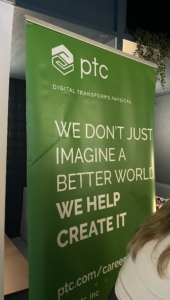 We Don’t Just Imagine a Better World, We Help Create It – PTC
We Don’t Just Imagine a Better World, We Help Create It – PTC
At first glance, I thought that PTC might be a company that provided tech solutions for NGO’s around the world – Maybe? This assumption came from their use of terms like “better world” and “help” in the same sentence.
After some research, I concluded that PTC helps companies use digital tools to make their work easier and more efficient. But if that’s the case, why not just say it? Since when did ambiguous phrasing become the preferred choice in copy? Clear, direct language is always more effective.
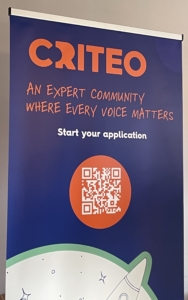 An Expert Community Where Every Voice Matters – Criteo
An Expert Community Where Every Voice Matters – Criteo
I don’t get it – is it a union thing? Or do buzzwords still make an impact?
I scoured their website to find some sort of simple, straightforward explanation of what they actually do. After about 15 minutes of wading through jargon and fluff, I gave up and asked ChatGPT to break it down for me: “Criteo helps companies show ads for products that people might actually want to buy. Their system looks at what people like and have bought before, then suggests new items through ads on websites and apps.”
So, the banner that promotes Criteo doesn’t actually relate at all to the service they provide. Wouldn’t it be more appealing to state something like, “Connecting you with products you’ll love” or “Smart ads for smarter shopping”?
On the other hand, if it’s a slogan aimed at attracting potential employees, then couldn’t that slogan be used by just about any company exhibiting at a job fair?
Just an observation.
If you’re a tech company looking for a copywriter in Barcelona who knows a thing-or-two about how words work, contact Copywriter Collective today.


